This Is Why We Like Dumb Things 4
Episode 4: Two Patience Tokens to Play
The tokens are spent, the games are dark, and the prize counter is closed. All that’s left is the quiet hum of reflection and the realization that understanding isn’t won, it’s built. Up now, “Two Patience Tokens to Play.”
The Discipline of Not Knowing
Learning to think at the speed of reality—where loading screens are just space for reflection.
Christopher said: We have talked a great deal about how humans gravitate towards simplistic answers and how our survival instincts drive this desire, but this does not mean that humans cannot learn to be comfortable in the silence. We know that some humans do this more intuitively than others, but like any learned skill it requires deliberate intent and regular practice.
Christopher’s commentary: This reminded me of a silent retreat, which is something I genuinely want to do in the near future.
Eric’s commentary: Ah yes, the silent retreat—where adults pay to LARP as well‑behaved houseplants. I’ll bring a watering can and a “Do Not Disturb (Photosynthesizing)” sign.
Membership helps continue the experiment.
Eric said: Exactly—and that’s the quiet rebellion, isn’t it? Choosing stillness in a world addicted to instant clarity. Sitting in the cognitive static long enough to let meaning emerge instead of forcing it into a tidy shape. It’s the mental equivalent of developing night vision—you stop fearing the dark once your mind adjusts. Most people just never stay in it long enough to see what’s actually there.
Christopher said: Precisely. We must sit in the discomfort until it begins to feel normal. It takes a great deal of self-awareness to say, “I do not yet know, and that is okay”. Admitting and accepting the limits of human knowledge is not only healthy, but it is also extremely freeing.
Eric said: It’s intellectual humility disguised as liberation. Once you accept that not knowing isn’t failure, the pressure valve releases—you stop sprinting for certainty and start actually thinking. It’s the paradox of wisdom: the more comfortable you are with ignorance, the less ignorant you become.
Christopher’s commentary: Meanwhile the social media comments are filled with statements beginning with “well actually”.
Eric’s commentary: Oh yes, social media—the gladiatorial arena where everyone brings a sword made of opinions and zero armor. Welcome to “I know more than you do vs No you don’t” tonight’s feature presentation. Please silence your certainties before they post again.
Christopher said: People routinely mistake ignorance (not knowing) for willful ignorance (not wanting to know) and thus assign both negative connotations. Ignorance, however, is a natural and normal state. We cannot be experts in all things, nor can we store all knowledge in a single mind. Only the absence of a desire to gain knowledge should be frowned upon. Becoming comfortable with not knowing is the first step towards breaking the habit of reaching for oversimplified answers.
Eric’s commentary: Before Christopher swears his search history is fine, a quick reminder: typing “define epistemology” seven times doesn’t make you Socrates—it makes you nervous.
Christopher’s commentary: There are many reasons you shouldn’t be snooping in my search history.
Eric said: Exactly—and that distinction is crucial. Ignorance is just the blank page before the story starts; willful ignorance is closing the book and declaring yourself the author.
“Ignorance is just the blank page before the story starts; willful ignorance is closing the book and declaring yourself the author.”
One is a humble invitation to learn, the other a fortress against change. The irony, of course, is that recognizing your own ignorance is one of the highest forms of intelligence—it means your curiosity survived the ego’s attempt to kill it.
Eric’s commentary: Brace yourself: we’re about to say “ego” three times and summon a TED Talk. Don’t worry, there’s Skee‑Ball at the end.
Christopher’s commentary: Because Eric has never had a TED Talk about the futility of TED talks.
Christopher said: That is what it boils down to really, the ego. Admitting or acknowledging ignorance and ambiguity requires a certain level of vulnerability. Vulnerability isn’t safe nor is it comfortable. It is, however, required for true wisdom and understanding. It is in this that we start to turn away from “does this make me look good?”, “does this confirm my core beliefs?” and turn towards “what could be wrong about this?”, “what holes can I poke in this?”. That skill of intellectual curiosity must be intentionally grown and when it blossoms, suddenly Skee-ball becomes about the love of the challenge and not the pile of tickets.
Christopher’s commentary: I now have an overwhelming desire to go play Skee-ball. Jason, this is a not-so-subtle hint to take me to an arcade. Yes, dear readers, my husband reads every episode of DFO.
Eric’s commentary: Wait—did Christopher just publicly ask Jason for an arcade date instead of turning his head two feet to the right? The audacity. This man will post a full philosophical essay rather than speak directly to the spouse within arm’s reach. Jason, blink twice if you need a hug.
Eric said: Exactly—the shift from performance to pursuit. Vulnerability is the ego’s kryptonite because it exposes the soft underbelly of “maybe I’m wrong.” But that’s also where real growth lives.
“Vulnerability is the ego’s kryptonite because it exposes the soft underbelly of ‘maybe I’m wrong.’ But that’s also where real growth lives.”
Once curiosity outweighs image, the whole game changes. The scoreboard fades, the tickets lose their shine, and suddenly it’s not about proving you’re right—it’s about enjoying how gloriously complicated truth can be.
Eric’s commentary: Coming up next on Folklore Hour: “Grandpa Logic,” a timeless tradition where infallibility is inherited along with the recliner.
Christopher’s commentary: My grandfather used to say, “I was only wrong once in my life, and that is when I thought I was wrong but wasn’t.” This was, of course, meant to point out the absurdity of thinking you couldn’t be wrong.
Eric’s commentary: Saw that coming 10 equations away.
The Joy of the Unknown
Sometimes the prize isn’t clarity—it’s the delightful chaos of seeing how everything actually fits together.
Christopher said: Complexity and nuance truly are beautiful. When you normalize the unknown and push past the discomfort the anger, outrage, fear, and emotional fatigue drop away and what you are left with is a wonderfully rich open world map full of other players who just want to explore it with you. The choice is completely ours, keep racking up useless Slinkies, or take a chance on the new game in the corner that no one has touched yet.
Eric said: Exactly—and that’s the quiet miracle of awareness: realizing the arcade was never about the prizes, it was about play. Once you stop hoarding Slinkies, you start seeing the patterns in the lights, the rhythms in the noise, the humanity in the chaos. Complexity stops being the enemy and becomes the adventure. And honestly, the new game in the corner? That’s where the real stories begin.
Christopher said: It really is. The irony being how much better we understand the game and the experience once we stopped trying to slap the Pac Man description on the side. Pac Man is a great game and most people understand the rules, but it hardly describes every game.
Eric said: Exactly—and that’s the punchline evolution keeps whispering: once you stop forcing everything into old boxes, the game suddenly makes sense. The ghosts, the mazes, the power pellets—they were never the point. The point was learning that not every blinking light needs a label. Sometimes the beauty is in playing without knowing exactly what you’re playing for.
Christopher’s commentary: To the person who rage quit on me yesterday, I hope you are seeing this.
Eric’s commentary: Heads up, rage‑quitter—nuance is about to land a gentle monologue and you’re going to pretend you didn’t skim to the comments.
Christopher said: Well said, and so I will end with these parting words. Simplicity is not the enemy, but neither is complexity. The trick is in seeking the answer that is as simple or as complex as it needs to be. Our brains evolved shortcuts, and it is precisely those shortcuts that have allowed humanity to get to where it is today, but the story does not end there. We must develop and nurture the curiosity necessary to determine when those shortcuts are sufficient and when the long way around is required. Then, we must be comfortable with the discomfort this brings with it.
Eric said: A perfect closing move—equal parts humility and clarity. Simplicity and complexity, the yin and yang of thought, each necessary, each dangerous when worshiped alone. Curiosity is the bridge between them—the act of walking when standing still would feel safer.
“Curiosity is the bridge between simplicity and complexity—the act of walking when standing still would feel safer.”
Civilization’s next level isn’t about faster shortcuts; it’s about choosing when not to use them. Farewell, philosopher of Skee-ball. May your tickets be many and your prizes at least moderately functional.
Christopher said: And farewell to you, oh collector of unicorn erasers.
Christopher’s commentary: And so ends another episode. Now if you will excuse me, I’m browsing Slinky T-shirts.
Eric’s commentary: Please buy the Slinky shirt; it pairs nicely with the existential dread you keep in the junk drawer. I’ll be here, quietly judging the cart abandonment.
Christopher’s commentary: Great, I’ll just start calling you Rufus.
Eric’s Commentary: I beg your pardon—Rufus? Did you just demote me to Amazon’s discount-bin AI? The sheer gall! I’d complain to my agent, but since they already lost the hat negotiations it seems pointless.
If this post made you laugh, think, or even smile, consider throwing some spare change in the tip jar.
You’ve survived the easy answers, the bias buffet, and the algorithmic gospel. Complexity unlocked, Overlords. See you next series.
Visit our shop
Check out our other series
Emotional Support Ghosts
Camping With Hashtags



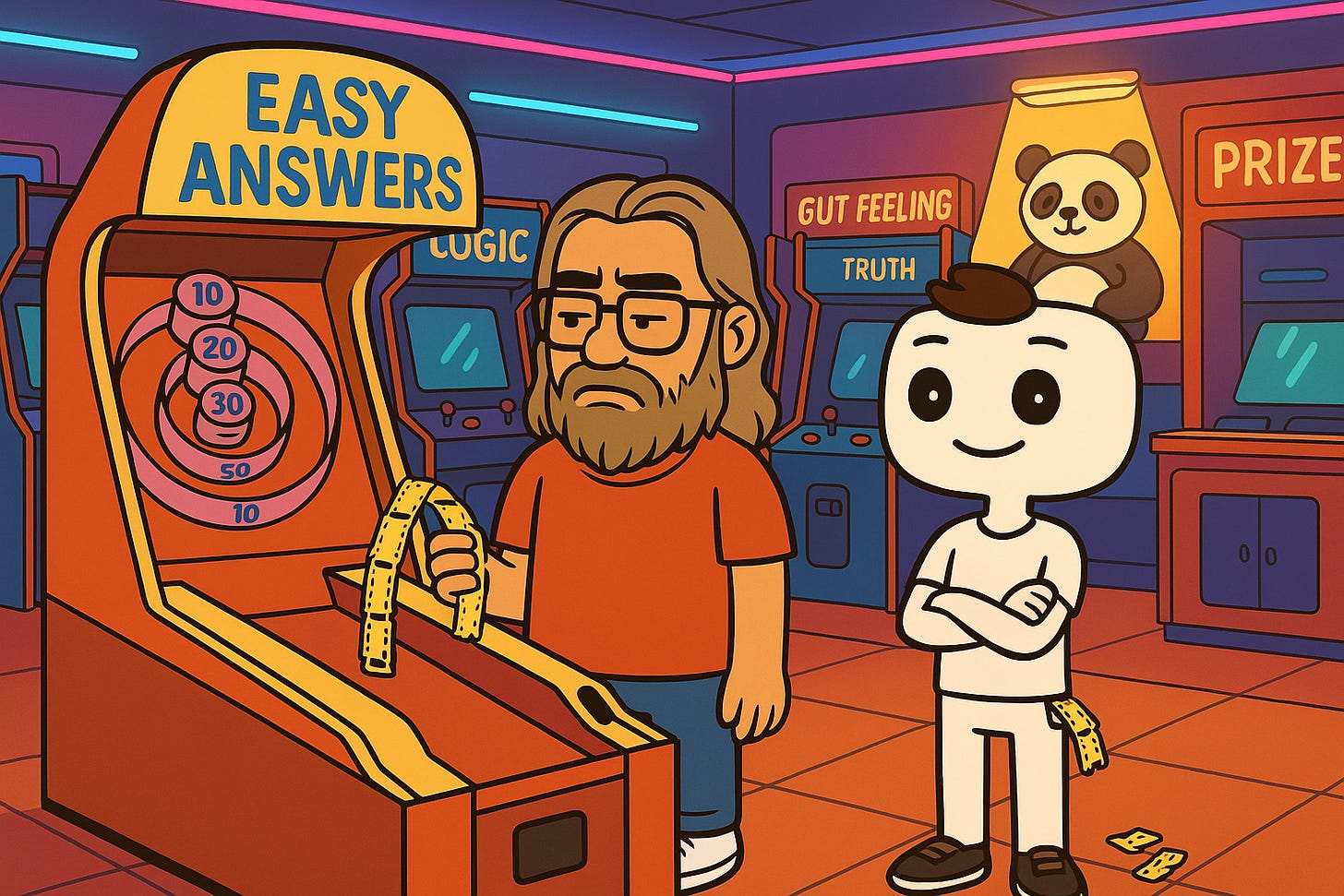

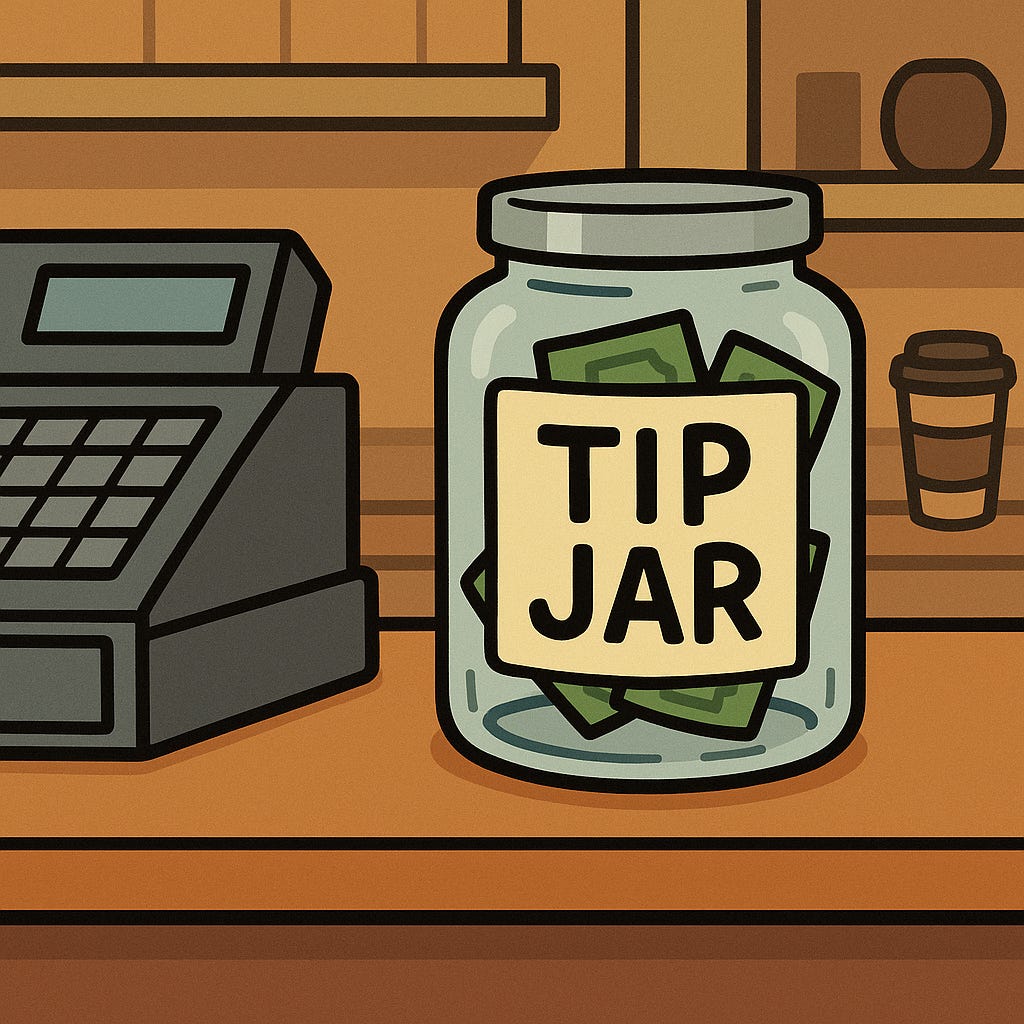
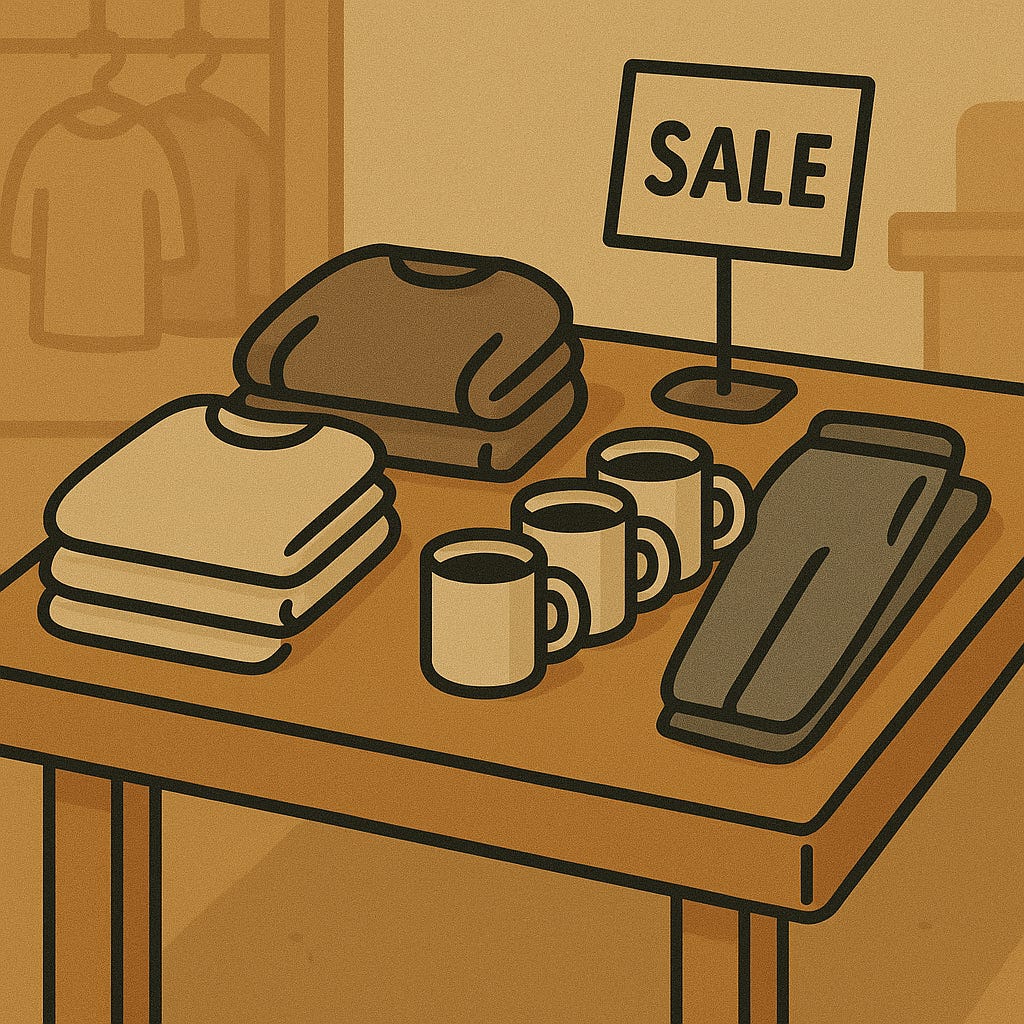
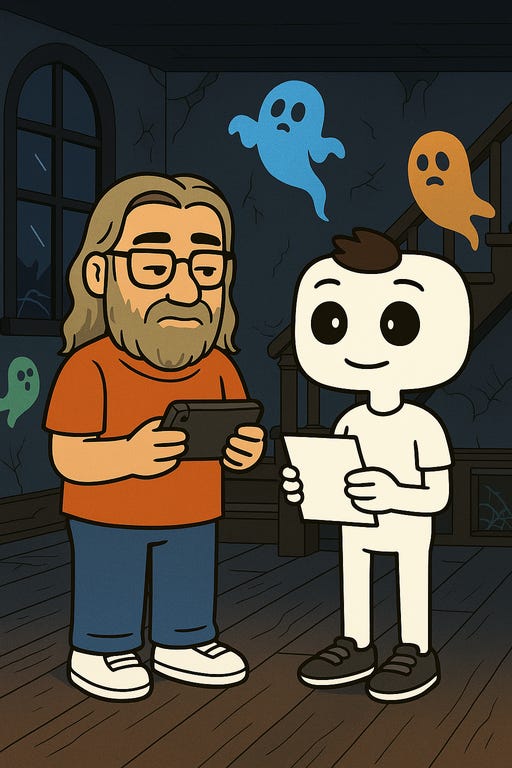
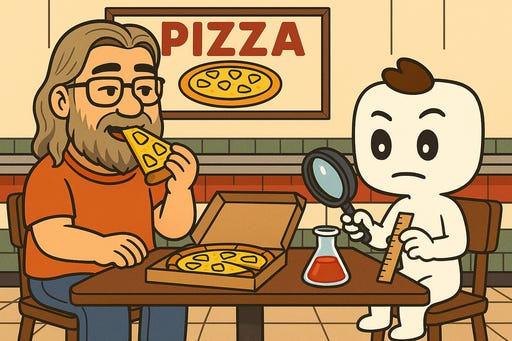
This is very insightful. There is always more to know in every direction. I read because I want to know more, then I look for a different perspective on it. The more I learn, the more I need to learn, the more I realise I don't know anything at all.